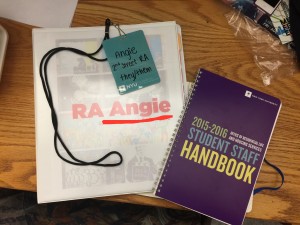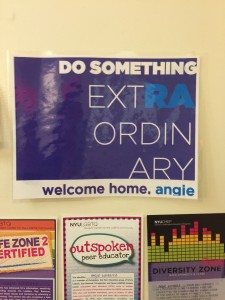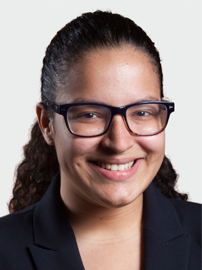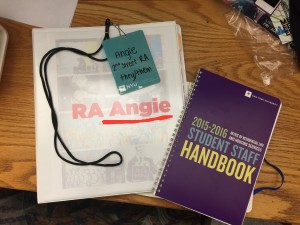by HSBC Point Scholar Angelique Gonzalez
When it comes to allyship in the LGBTQ community, I’ve been tired of hearing, “I’m trying,” “I forgot,” and “Oh, I didn’t know.” I’m not one to side with elitism, but when we’re talking about college students, I feel that there should be little-to-no error on some things, like one’s gender pronouns, things you shouldn’t say, and basic allyship practices. In class, when our professor teaches something we don’t understand, we look it up, research it, and become a master at it. Why is the drive to learn more about LGBTQ allyship minimal when compared to our drive to get an “A” in a class?
Last week, I was planning on facilitating a workshop for some Resident Assistants (RA) at NYU, but sadly, our training was cancelled due to the winter storm. I called the workshop, “LGBTQIA-RA,” and aimed to focus on how RAs can be better allies to LGBTQ-identified staff members, other RAs, and the people we serve, our residents. Some things I really wanted to tackle were how to handle someone coming out to you, the fluidity of both gender and sexual orientation, and specific ways RAs can use their power to create change.

As a student leader on-campus, I’ve been outed more times than you can imagine. Sure I’m out on Facebook, in most of my workspaces, and as a student leader in my respective groups, but there have been times that my identity has been shared without my consent or put on display for people to view as something “foreign” or “different.” I think that most of the time, these people had great intentions or did it unconsciously, which inspired me to emphasize the important responsibility that comes when someone comes out to you. The time when someone comes out to you can be directly related to babysitting a child: When babysitting a child you need to know his allergies, emergency contacts, his bedtime, and his favorite foods. You need as much information to keep a child safe - which is the same extreme for an LGBTQ person who just came out to you. When someone comes out to you, you need to have your “safety net” questions ready. Who else knows? Do you plan on coming out to anyone else? Is it safe for you to come out to anyone else? What do you have to risk by coming out? What support do you need from me right now?
Also, something I planned on addressing was how important gender pronouns are. As someone who uses both they/them and she/her pronouns, I can strongly identify with residents who get misgendered. Usually the use of my pronouns depends on the space I’m in, how I’m feeling, and how safe I feel to come out using non-binary pronouns. As “small” of a thing that pronouns may seem, for transgender and gender non-conforming people, gender pronouns are extremely important. Being misgendered can be extremely triggering for some LGBTQ folks, so I also planned on emphasizing the importance of using one’s gender pronouns and always asking for gender pronouns in group  settings.
settings.
When it comes to the lives of LGBTQ people, we, as RAs, should have all of these things at the forefront of our minds - not just taking a 1 hour training and not looking back over the information. When a transgender student lives on our floor, we should be looking up information on transgender people, basic allyship practices, and resources for that student. When a person on our floor uses non-binary gender pronouns, we should be using websites to practice those pronouns. When our residents are facing discrimination based on their gender identity or sexual orientation, we should know how to intervene, who to tell about the act, what are the victim’s options, and resources for the victim as well.
I think being a Point Scholar has heavily boosted my confidence in the work that I do and motivates me to push beyond my limits - including applying to facilitate a training, even though it was originally only for professional staff members to apply (oops!). People can take 1,000 trainings on diversity and inclusion, and still mess up. Given that we’re all humans and bound to make mistakes, it is inevitable! In my experience, folks not completely dedicated to social justice or equality seem to let things slip more often than those who have LGBTQ people at the forefront of their mind. When it comes to allyship to the LGBTQ community, I’ve learned that it is all about paying attention and being intentional with your actions.
This post was written by HSBC Point Scholar Angelique Gonzalez
 Angeliques personal mission for the remainder of her time at NYU is to engage in communities outside of the LGBTQ community to help create safer spaces for LGBTQ folks and educate those communities on LGBTQ issues. Inspired by her stepfather, Angelique aspires to help create and innovate technology for disabled adults and children. She also hopes to pursue a masters and a doctorate in the engineering field.
Angeliques personal mission for the remainder of her time at NYU is to engage in communities outside of the LGBTQ community to help create safer spaces for LGBTQ folks and educate those communities on LGBTQ issues. Inspired by her stepfather, Angelique aspires to help create and innovate technology for disabled adults and children. She also hopes to pursue a masters and a doctorate in the engineering field.
Read more about Angelique.

